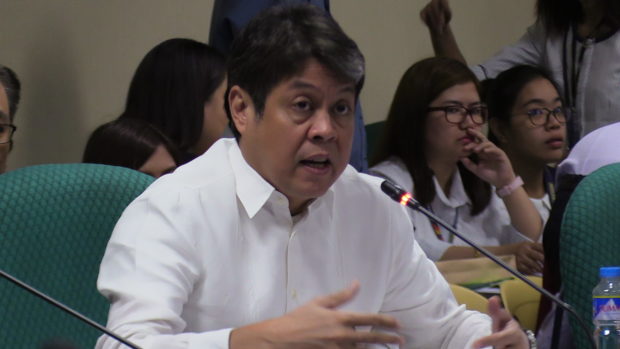13 senators back antidynasty bill

Senator Francis Pangilinan. INQUIRER.net / CATHY MIRANDA
A Senate bill that would ban political dynasties has moved a step forward after 13 senators signed a joint committee report on the proposed law that would prohibit persons from seeking public office if they are related up to the second degree to an incumbent elected official.
Thirteen senators have signed the eight-page report by the committee on constitutional amendments and the committee on electoral reforms on Senate Bill No. 1765, the proposed antidynasty law, according to Sen. Francis Pangilinan.
The bill, which consolidated six other measures, aims to fulfill a constitutional mandate to legislate an end to political dynasties—the monopoly of public office by a few families.
Those who would be covered by the ban include the legal and common-law spouses of incumbent officials, their full and half-blood siblings, their legitimate, illegitimate and adopted children, their parents and the spouses of all of these relatives.
In a text message to the Inquirer, Pangilinan, chair of the committee on constitutional amendments, on Thursday said the bill might face a tough challenge in both the Senate and the House of Representatives.
Pangilinan said opposition to the measure was coming from “a number of those who come from political dynasties.” He did not elaborate.
Ilocos Norte Gov. Imee Marcos, daughter of the late dictator Ferdinand Marcos, said it would be difficult to ban or regulate political dynasties with more than 60 percent of local officials belonging to influential political families.
“Theoretically, everyone is antidynasty, but it is difficult to think about it because (dynasty-controlled politicians) comprise local officialdom,” said Marcos, whose mother, Imelda, is a congresswoman.
Families with name recall and a network of supporters and relatives who are incumbent officials have an advantage over any challenger, she said.
“It is difficult to erase [them] although we also see many new leaders coming,” she added. “These are the real issues involved… the second degree is difficult if the place is really small. It is difficult to find candidates.”
A 2016 study by Ateneo School of Government shows that 77.5 percent of Congress members belong to powerful political clans.
Congress break
Pangilinan plans to present the committee report to the floor when Congress returns from its break in May, opening the bill for debate and amendments before a final vote.
Those who signed the report were Pangilinan, Senate President Pro Tempore Ralph Recto, Senate Minority Leader Franklin Drilon, and Senators Grace Poe, Leila de Lima, Risa Hontiveros, Loren Legarda, Nancy Binay, Panfilo Lacson, Joseph Victor Ejercito, Bam Aquino, Sonny Angara and Win Gatchalian.
Senators Richard Gordon, Francis Escudero, Cynthia Villar and Manny Pacquiao did not sign the report. Sen. Vicente Sotto III, who is an ex officio member of the joint committee as the Senate majority leader, dissented.
Lacson, Drilon, Ejercito, Poe, Legarda and Aquino each filed an antidynasty bill. The six senators, along with Pangilinan and De Lima, are the authors of the consolidated bill.
Proposed amendments
Hontiveros indicated her intention to interpellate and propose amendments. Gatchalian also said he would interpellate, and Recto said he would suggest amendments.
Ejercito said he had not yet spoken about his support for the bill with his father, former President Joseph Estrada, whose term as Manila mayor would have been over by the time the measure was passed.
“We have to give a chance to others,” he said at the Kapihan sa Senado forum.
Resource persons from academia, who were invited to the joint committee hearings, cited compelling reasons to ban political dynasties.
‘Killing democracy’
According to them, political dynasties are “killing democracy,” causing poverty and inequality, and preventing others from serving the public—especially younger and more able leaders.
People also lose control over abusive officials under the current political setup, they said.
The bill specifies the persons who would be prohibited from running for public office—from the barangay council all the way up to the national government.
According to the proposed measure, if the incumbent is a national elective official, his or her spouse and second-degree relatives would not be allowed to run simultaneously for any national or local office—as barangay captain, mayor, governor or district representative—in any part of the country. —WITH REPORTS FROM YOLANDA SOTELO AND INQUIRER RESEARCH














